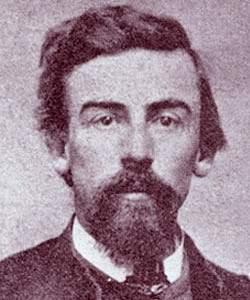Joseph Franklin Culver (Dickinson Chronicles)
Scholarship
Joseph Franklin Culver was born in Carlisle, Pennsylvania on November 3, 1834. He grew up in the town and enrolled in the local Dickinson College with the class of 1857. A popular and involved student who thoroughly absorbed the Methodist atmosphere of the institution. He was elected to the Belle Lettres Society at the College but withdrew before graduating to study law with William J. Shearer of Carlisle. He also studied at the Iron City Commercial College for a time, then left Pennsylvania for Ohio soon after. He continued his studies in Wooster, Ohio for several years, taught school in Burbank, Ohio, before settling in Pontiac, Illinois.
During the Civil War, in September 1862, he secured a lieutenant's commission in Company A of the 129th Illinois Infantry then being recruited and organized in Pontiac. He served throughout the remainder of the war in this regiment, including its 1864 "March to the Sea" with Sherman in Georgia, winning promotion to captain in the process. He mustered out in June 1865 and returned to Pontiac, where finally completed his legal studies, he was called to the Illinois bar. He moved quickly to prominence, served as mayor of the city for two terms and then as the county judge of Livingston County for four years. He then entered banking with his brother in Pontiac and soon expanded into real estate. In 1876 he was a delegate from the city to the Republican National Convention that nominated Rutherford B. Hayes and had served ten years as a trustee of the state reform school system in Illinois. Still a devout Methodist, he had also served as a chaplain to an Illinois national guard unit. In July 1879, he wound up his business in the state and took his expertise in real estate and the law to Emporia, Kansas where he practiced for the rest of his life. There he was elected a justice of the peace and was a Mason, and an active member of the local post of the Grand Army of the Republic and the local Methodist church.
In December 1861, he had married Mary Murphy, the New York born daughter of an Irish immigrant. The couple had seven children. The University of Iowa holds a sizeable collection of letters Culver wrote to Mary during his Civil War service and after. Joseph Franklin Culver died on January 20, 1899. He was sixty four years old.
During the Civil War, in September 1862, he secured a lieutenant's commission in Company A of the 129th Illinois Infantry then being recruited and organized in Pontiac. He served throughout the remainder of the war in this regiment, including its 1864 "March to the Sea" with Sherman in Georgia, winning promotion to captain in the process. He mustered out in June 1865 and returned to Pontiac, where finally completed his legal studies, he was called to the Illinois bar. He moved quickly to prominence, served as mayor of the city for two terms and then as the county judge of Livingston County for four years. He then entered banking with his brother in Pontiac and soon expanded into real estate. In 1876 he was a delegate from the city to the Republican National Convention that nominated Rutherford B. Hayes and had served ten years as a trustee of the state reform school system in Illinois. Still a devout Methodist, he had also served as a chaplain to an Illinois national guard unit. In July 1879, he wound up his business in the state and took his expertise in real estate and the law to Emporia, Kansas where he practiced for the rest of his life. There he was elected a justice of the peace and was a Mason, and an active member of the local post of the Grand Army of the Republic and the local Methodist church.
In December 1861, he had married Mary Murphy, the New York born daughter of an Irish immigrant. The couple had seven children. The University of Iowa holds a sizeable collection of letters Culver wrote to Mary during his Civil War service and after. Joseph Franklin Culver died on January 20, 1899. He was sixty four years old.
John Osborne and James W. Gerencser, eds., “Joseph Franklin Culver,” Dickinson Chronicles, http://chronicles.dickinson.edu/encyclo/c/ed_culverJF.htm.


